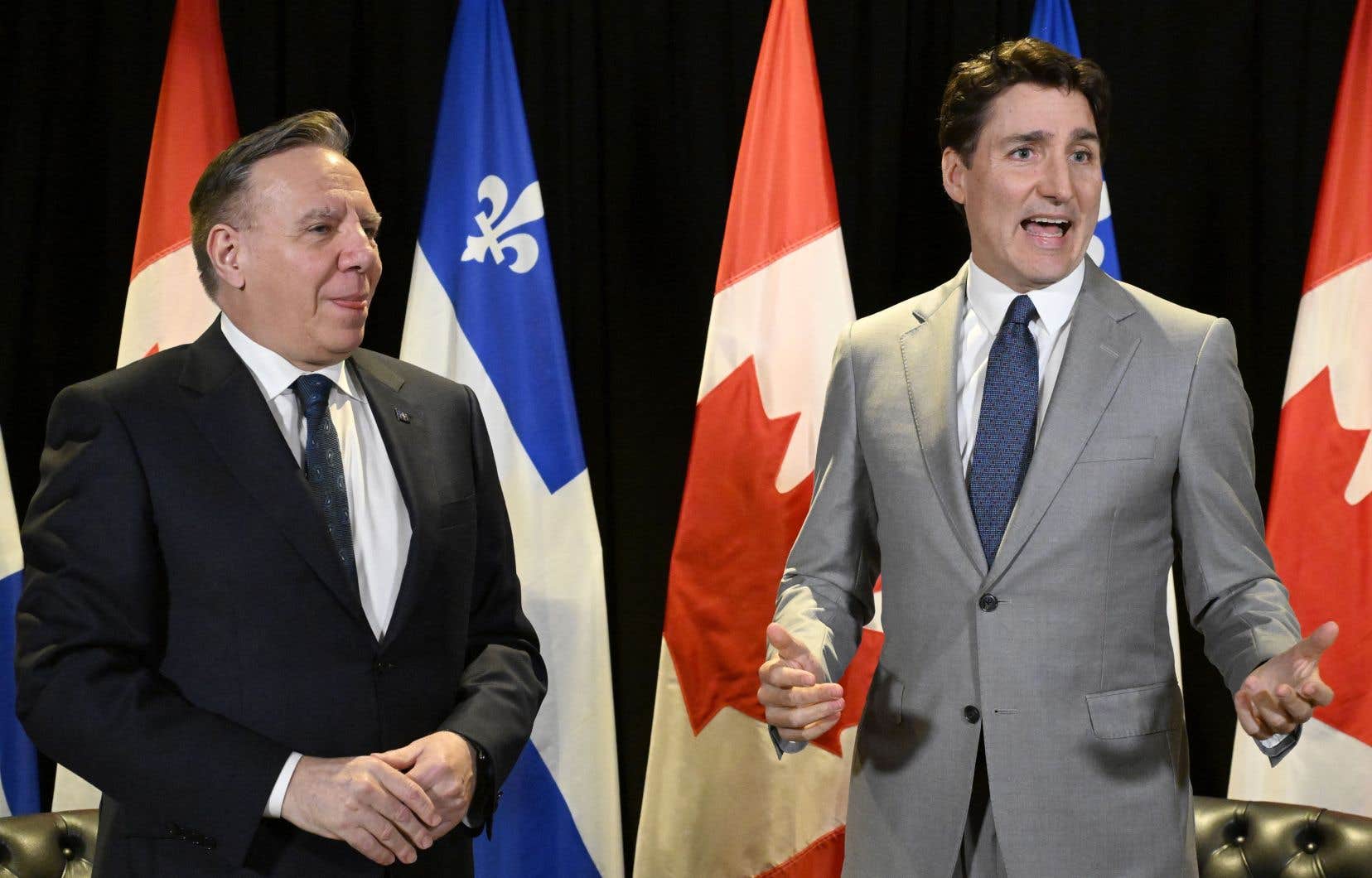At the end of a meeting with François Legault, Justin Trudeau agrees to impose new French language requirements on temporary workers linked to the federal system and will send $750 million to Quebec to cover services offered to asylum seekers from 2021 to 2023 Despite these commitments, the CAQ Prime Minister, who arrived at his bilateral meeting with a new quantified request, came away “disappointed”.
“We have achieved some progress, but there is still a lot, a lot of work to do,” summarized François Legault on Monday, at the end of an exchange of about an hour exclusively devoted to the theme of immigration. His federal counterpart had just presented him with a list of measures aimed at responding to the “emergency” generated, according to the CAQ Prime Minister, by the massive arrival in Quebec of temporary immigrants.
Concretely, Justin Trudeau’s government will respond to three quarters of Quebec’s financial requests to compensate for the costs incurred in 2021, 2022 and 2023 in welcoming asylum seekers. The Legault government demanded a billion dollars. “We’re going to take the 750 million. We would have liked to have had the one billion, but we are going to take the 750 million,” Mr. Legault said Monday during a press briefing held at the Château Frontenac in Quebec.
In addition to these additional funds, Ottawa will work “with other provinces to promote the voluntary movement of applicants [d’asile] outside Quebec. In December, Statistics Canada counted nearly 177,000 in Quebec alone. To reduce this number, Ottawa will set up a working group expected to make recommendations by the end of August. Recommendations that should be “implemented in September”.
“ [Ce sont] elements on which we are already working to remove a little bit of the pressure on Quebec,” said Mr. Trudeau, a few minutes after his counterpart spoke, and on a separate floor.
New French requirements
In March, Prime Ministers Trudeau and Legault met in Montreal for a first meeting on the theme of immigration, at the end of which the head of the federal government refused to entrust all powers in the area to Quebec. . Mr. Legault, however, welcomed Ottawa’s openness to imposing French requirements on temporary immigrants in the International Mobility Program (IMP).
Mission accomplished for the CAQ Prime Minister on this front: “workers renewing their work permit after three years under the PMI will have to prove their skills in French,” offered Mr. Trudeau on Monday. This is a mirror measure to that which the Legault government is preparing to impose on temporary workers who fall under Quebec’s jurisdiction, namely those in the Temporary Foreign Worker Program (TFWP).
Although favorable to the provincial government’s French protection policies, this measure does not resolve the problem of Quebec’s reception capacity, Mr. Legault said on Monday.
Immigration at the origin of “100% of the housing problem”
According to his calculations, “100% of the housing problem in Quebec comes from the increase in the number of temporary immigrants.” The Premier of Quebec also attributes “half” of the problems in providing education services and “a third” of the difficulties in the health network to the presence of some 560,000 non-permanent residents in Quebec.
“When we are no longer able to house families, when we are no longer able to send children to school, when we are no longer able to have access to health services, when we are no longer able to no longer able to slow down the decline of French, we are in an emergency situation,” proclaimed Mr. Legault while presenting a new quantified request to his counterpart: reduce by 50% the number of asylum seekers and workers in the PMI in Quebec.
Asked about this reading by Prime Minister Legault, Mr. Trudeau refused to “blame […] immigrants “. “Quebecers and Canadians know that it is not always the best thing to do, to target and say ‘it’s all the fault of immigrants’,” he said.
Subject to the quantified demands of his counterpart, the Canadian Prime Minister demanded the same from Mr. Legault. “Quebec has control, direct or indirect, over more than half of temporary immigrants to Quebec. And so, […] if this is what Quebec wants in terms of immigration, we must [qu’il présente lui-même] a plan to reduce [leur nombre] “, he indicated.
Quebec currently manages its temporary student programs and a portion — through the PTET — of fixed-term work permit holders. Asked about this on Monday, Mr. Legault did not present targets for reducing the number of people in these categories, but still said he was open to studying this possibility.
